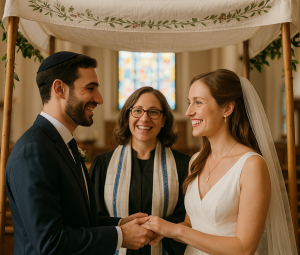 TORONTO — The new executive vice-president and CEO of the United Synagogue of Conservative Judaism says that even though the “vast majority” of American Conservative congregations are egalitarian, he “absolutely” sees a place in his group for non-egalitarian synagogues such as those in Toronto that have left the umbrella organization, and three of the four in the city that remain affiliated with it.
TORONTO — The new executive vice-president and CEO of the United Synagogue of Conservative Judaism says that even though the “vast majority” of American Conservative congregations are egalitarian, he “absolutely” sees a place in his group for non-egalitarian synagogues such as those in Toronto that have left the umbrella organization, and three of the four in the city that remain affiliated with it.
Rabbi Steven Wernick
Rabbi Steven Wernick took over the leadership of the USCJ, which comprises some 700 North American congregations, from Rabbi Jerome Epstein on July 1, when the latter retired after 23 years as its head.
The new CEO, a 42-year-old former congregational rabbi, said in an interview that he hears frequently “that pluralism is one of our primary values, and we need to be a big tent. And I think we can be a big tent, and we are a big tent.”
He spoke to The CJN last week at Shaar Shalom Synagogue, where he had just met with local executive directors of synagogues. He also met with Conservative rabbis and lay leaders in one of a series of initial visits to about a dozen cities.
Last year, Adath Israel Congregation, Beth Emeth Bais Yehuda Synagogue and Beth Tzedec Congregation left the USCJ, citing mainly financial concerns but also philosophical differences.
In late 2005, those philosophical differences came to the fore when Rabbi Menachem Creditor, then based in Sharon, Mass., said at the Conservative movement’s biennial convention that allowing non-egalitarian congregations in the movement was immoral.
The following December, further differences were highlighted when the movement’s committee on Jewish law and standards endorsed conflicting opinions on homosexuality, one of which allowed commitment ceremonies for gay and lesbian couples, as well as the ordination of gay and lesbian rabbis.
Rabbi Wernick said that despite differences in religious practice within the Conservative movement, Conservative Jews share a set of values and the same approach to Jewish text study. “They may have different conclusions, but the process is the same.
“Toronto is a significant Jewish community, and United Synagogue as an international organization has to understand what the issues are and be able to respond to them in meaningful ways,” he said.
“It’s important for this new face to come here and talk about a new vision and explore opportunities for not only strengthening our ties with those congregations that remain a part of United Synagogue, but to explore the opportunities that exist for building bridges with those that are not.”
Although noting it’s early to say what direction the relationship between the USCJ and Canadian congregations will take, Rabbi Wernick said that he thought there was “a lot of goodwill for engaging in a process.”
Paul Kochberg, president of the USCJ’s Canadian region, lauded the rabbi for recognizing “that change is needed in the organization immediately… He’s been the driving force behind change that has been discussed for years.”
Among the changes he was referring to is the creation of six districts out of the 15 USCJ regions, which has already begun and is expected to be finished by the end of June 2010.
As part of the reorganization, the Canadian region will merge with three northeastern U.S. regions to form the USCJ’s new northeast district.
The Canadian regional office in Toronto is expected to remain open, Kochberg said.
Efforts to reach Harvey Schiller, president of the Canadian Council of Conservative Synagogues – which was initially formed by the three breakaway congregations plus Beth Sholom Synagogue – for comment before The CJN’s deadline were unsuccessful.
Rabbi Wernick – who has been credited with revitalizing Philadelphia’s Adath Israel, the synagogue he led from 2001 until this year – had every intention of continuing as a pulpit rabbi, but said he couldn’t turn down the opportunity to “have a voice in shaping the future of this movement that I love… I had to be part of that.”
Musing on the parallels between his Philadelphia shul and the Conservative movement, whose numbers are shrinking across North America, he cautioned that the USCJ is not a synagogue and the revitalization process must be different.
That said, he noted that each institution has faced the same issue: determining its purpose, and asking how to best organize to become “something really special and unique.”
The son of a Conservative rabbi, Rabbi Wernick – a native of Philadelphia – spent his junior high and high school years in Winnipeg, where he was active in the movement’s youth arm, United Synagogue Youth. Losing his mother at age 15, he experienced community in an intense way through the support of his USY group.
He recalls that time as “kind of a seminal moment that continues to inform every aspect of who I am as a human being.”






